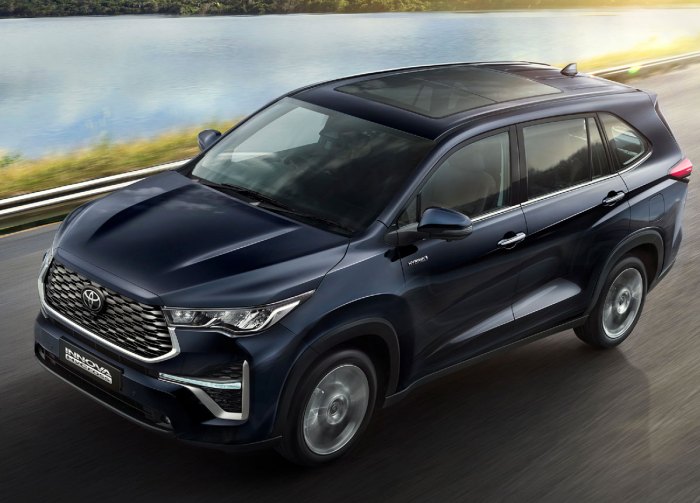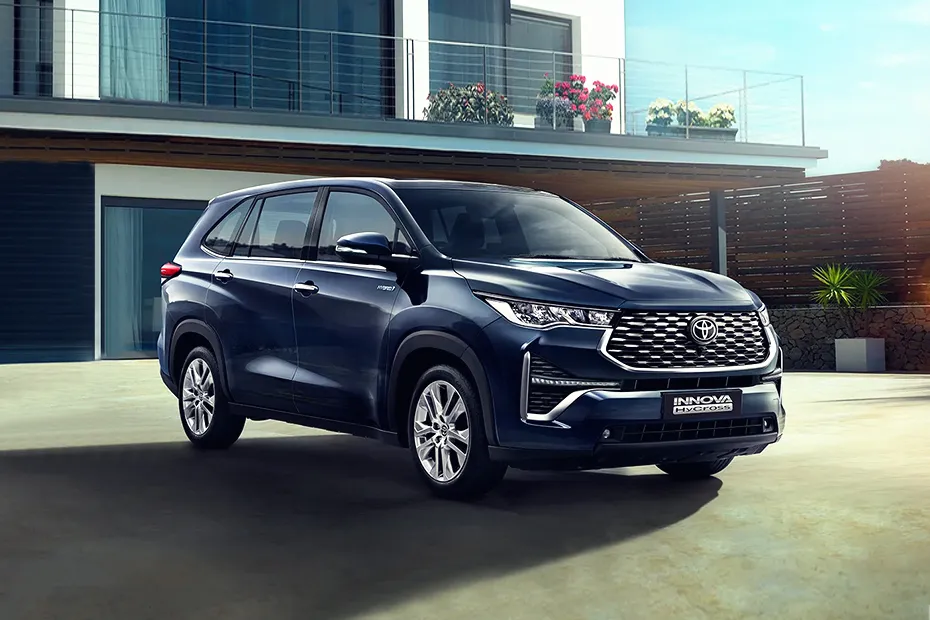Table of Contents
Introduction:
In an age where global environmental consciousness is on the rise, the automobile industry is making a pivotal shift towards cleaner, eco-friendly transportation solutions. The unveiling of the Toyota Innova HyCROSS the world’s first 100% ethanol-powered vehicle, marks a significant stride towards a greener and cleaner future in the automotive sector.
The Ethanol Revolution
Ethanol, also known as ethyl alcohol, stands as a renewable biofuel derived from organic sources like corn, sugarcane, and wheat. In contrast to conventional fossil fuels such as gasoline and diesel, ethanol shines as a sustainable alternative, thanks to its reduced carbon footprint and diminished greenhouse gas emissions.

Toyota’s Bold Move
Toyota’s launch of the Innova HyCROSS serves as a testament to the company’s unwavering commitment to environmental sustainability and innovation. This automotive giant, renowned for its pioneering spirit, has once again taken a daring step by introducing the world’s first mass-produced ethanol-powered car.
Key Features of Toyota Innova HyCROSS
- Ethanol-Powered Engine: The Innova HyCROSS boasts an advanced ethanol-powered engine that operates exclusively on 100% ethanol. This departure from traditional gasoline or diesel engines substantially reduces the vehicle’s carbon emissions and dependency on fossil fuels.
- Sustainable Fuel Source: Ethanol’s renewable nature positions it as an eco-conscious choice for fueling vehicles. Its production and usage contribute to a decrease in greenhouse gas emissions, a crucial step in combatting climate change.
- Enhanced Performance: Despite relying on ethanol, the Innova HyCROSS doesn’t compromise on performance. Its cutting-edge engine technology ensures a smooth and powerful driving experience, all while delivering impressive fuel efficiency.
- Reduced Emissions: This vehicle’s standout feature is its minimal emissions output. Ethanol burns cleaner than gasoline, emitting fewer harmful pollutants into the atmosphere, ultimately leading to improved air quality and a reduced environmental footprint.
- Commitment to Sustainability: Toyota’s decision to introduce the Innova HyCROSS underscores the company’s dedication to sustainability. By offering consumers an ethanol-powered option, they are actively contributing to the reduction of carbon emissions in the automotive industry.
The Ethanol Advantage
Ethanol as a fuel source presents several distinct advantages over traditional fossil fuels, making it an appealing choice for consumers and the environment:
- Renewable Resource: Unlike finite fossil fuels, ethanol derives from renewable organic materials like corn and sugarcane. This ensures that its production can be sustained without depleting vital natural resources.
- Reduced Greenhouse Gas Emissions: Ethanol combustion results in significantly lower carbon dioxide (CO2) emissions compared to gasoline. The carbon dioxide released during ethanol burning is offset by the carbon dioxide absorbed by the crops used in its production, rendering it a carbon-neutral fuel.
- Local Production: Ethanol is often produced locally, diminishing reliance on foreign oil imports and bolstering energy security. This localized production also supports rural economies by generating jobs and promoting agriculture.
- Air Quality Improvement: Vehicles powered by ethanol emit fewer pollutants such as carbon monoxide (CO) and volatile organic compounds (VOCs) when compared to gasoline-powered vehicles. This positive impact enhances urban air quality, reducing smog and related health issues.
- Compatibility with Existing Infrastructure: Many vehicles can run on ethanol blends with minimal modifications, and the existing fueling infrastructure can often accommodate ethanol fuels. This ease of transition to ethanol-based vehicles simplifies the process of adopting cleaner fuel options.
Toyota’s Vision for a Sustainable Future
Toyota has consistently been at the forefront of environmentally friendly transportation. The introduction of the Innova HyCROSS is part of a larger strategy to build a sustainable future in mobility. Toyota’s commitment to reducing its carbon footprint extends beyond its product offerings; it also includes recycling programs, waste reduction, and increased energy efficiency in production processes.
In addition to the Innova HyCROSS, Toyota has actively contributed to the development of hybrid and electric vehicles, supporting the global transition towards cleaner transportation options. These initiatives align with the company’s dedication to the United Nations’ Sustainable Development Goals, particularly Goal 7 (Affordable and Clean Energy) and Goal 13 (Climate Action).
The Future of Ethanol-Powered Vehicles
The launch of the Toyota Innova HyCROSS represents a pivotal moment in the automotive industry’s journey towards sustainability. As more automakers embrace ethanol and other renewable fuel sources, we can anticipate a broader selection of ethanol-powered vehicles catering to diverse consumer preferences and needs.
Governments worldwide will continue to play a vital role in promoting the adoption of ethanol-powered vehicles through incentives, subsidies, and regulatory measures aimed at reducing emissions and encouraging the use of cleaner fuels. This, in turn, will provide consumers with a wider range of environmentally friendly options when selecting their next vehicle, contributing to a cleaner and healthier planet.

Government Support and Initiatives
The introduction of the Toyota Innova HyCROSS coincides with a global push by governments for cleaner and more sustainable transportation solutions. In countries like India, for example, figures like Nitin Gadkari, the Minister of Road Transport and Highways, have been vocal advocates for ethanol-based fuels. Their support and initiatives have played a pivotal role in promoting the adoption of ethanol-powered vehicles within their respective nations.
The Road Ahead
The Toyota Innova HyCROSS marks a significant milestone in the automotive industry’s journey towards sustainability. As consumers increasingly prioritize eco-friendly options, the demand for ethanol-powered vehicles is likely to rise. This transition not only benefits the environment but also reduces our reliance on finite fossil fuel resources.
Conclusion:
The Toyota Innova HyCROSS stands as a groundbreaking achievement in the automotive world, showcasing the potential of ethanol as a clean and sustainable fuel source. Toyota’s commitment to innovation and environmental responsibility sets an inspiring example for the entire automotive industry.
As we move forward, it is crucial for both the automotive sector and governments to collaborate in the pursuit of cleaner and more sustainable transportation solutions. The success of vehicles like the Innova HyCROSS not only benefits our environment but also paves the way for a brighter and more sustainable future for generations to come.
Also checkout our recent blogs: Blogsroom
if you are interested in IPO related content then make sure to check out ipohunts.
If you are Interested in cricket buzzers and updates then make sure to check out crikzone.
